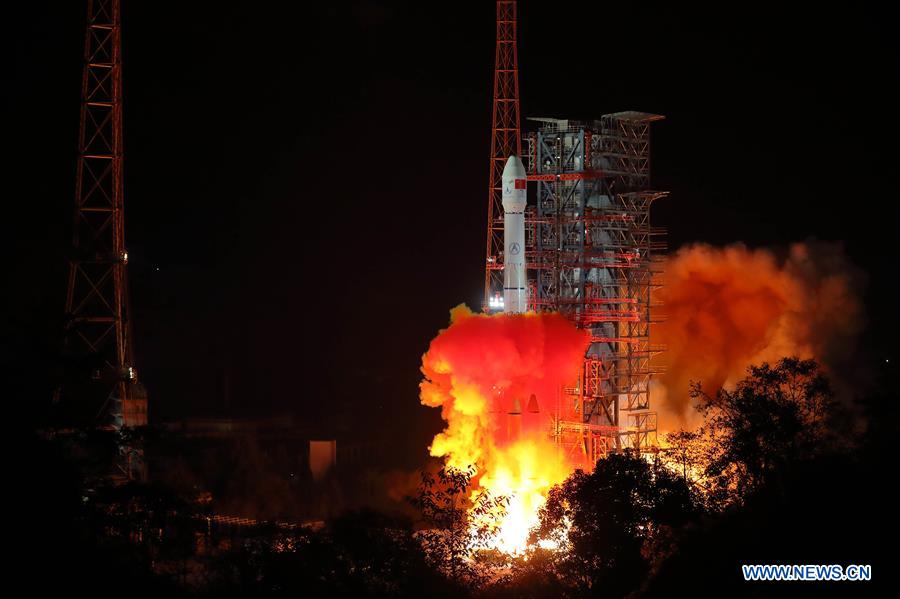
China launches Chang'e-4 lunar probe in the Xichang Satellite Launch Center in southwest China's Sichuan Province, Dec. 8, 2018. The probe is expected to make the first-ever soft landing on the far side of the moon. A Long March-3B rocket, carrying the probe including a lander and a rover, blasted off from Xichang at 2:23 a.m., opening a new chapter in lunar exploration. The scientific tasks of the Chang'e-4 mission include low-frequency radio astronomical observation, surveying the terrain and landforms, detecting the mineral composition and shallow lunar surface structure, and measuring the neutron radiation and neutral atoms to study the environment on the far side of the moon, the China National Space Administration announced. China has promoted international cooperation in its lunar exploration program, with four scientific payloads in the Chang'e-4 mission developed by scientists from the Netherlands, Germany, Sweden and Saudi Arabia. (Xinhua/Jiang Hongjing)
XICHANG, Dec. 8 (Xinhua) -- China's Chang'e-4 lunar probe was launched in the early hours of Saturday, and it is expected to make the first-ever soft landing on the far side of the moon.
A Long March-3B rocket, carrying the probe including a lander and a rover, blasted off from the Xichang Satellite Launch Center in southwest China's Sichuan Province at 2:23 a.m., opening a new chapter in lunar exploration.
Since the moon's revolution cycle is the same as its rotation cycle, the same side always faces the earth. The other face, most of which cannot be seen from earth, is called the far side or dark side, not because it's dark, but because most of it remains unknown.
The Chang'e-4 mission will be a key step in revealing the mysterious far side of the moon.
"The soft landing and exploration of the far side, which has never been done before, will gain first-hand information about the terrain and lunar soil components and other scientific data, which will help enrich our understanding of the moon and the universe," said Zhang He, executive director of the Chang'e-4 probe project.
The scientific tasks of the Chang'e-4 mission include low-frequency radio astronomical observation, surveying the terrain and landforms, detecting the mineral composition and shallow lunar surface structure, and measuring the neutron radiation and neutral atoms to study the environment on the far side of the moon, the China National Space Administration (CNSA) announced.
China has promoted international cooperation in its lunar exploration program, with four scientific payloads of the Chang'e-4 mission developed by scientists from Netherlands, Germany, Sweden and Saudi Arabia.
Three scientific and technological experiments, designed by Chinese universities, will also be carried out during the mission.
Scientists believe the special electromagnetic environment and geological features on the far side of the moon will be suitable for low-frequency radio astronomical observation and research into lunar substances composition.
However, landing and roving there requires a relay satellite to transmit signals.
China launched the relay satellite "Queqiao", meaning Magpie Bridge, on May 21 to set up the communication link between the earth and the moon's far side.
The satellite has successfully entered a halo orbit around the second Lagrangian (L2) point of the earth-moon system, about 455,000 km from the earth. It is the world's first communication satellite operating in that orbit, according to CNSA.
In orbit, the relay satellite can "see" both the earth and the far side of the moon. The earth's and moon's gravity balances the orbital motion of the satellite and makes it very fuel-efficient.
Saturday's launch was the 294th mission of the Long March rocket series.















